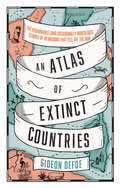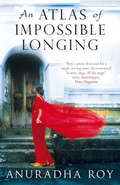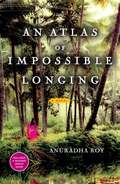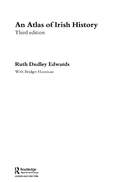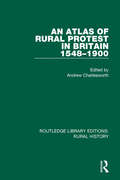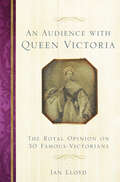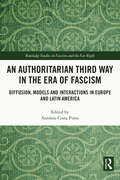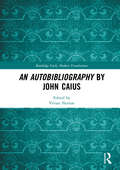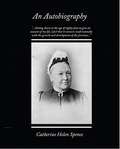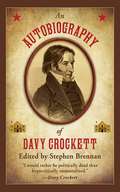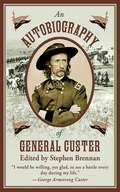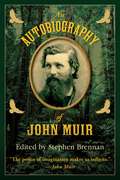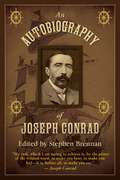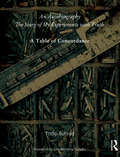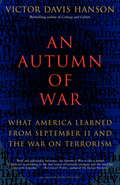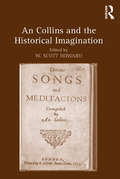- Table View
- List View
An Atlas of Extinct Countries
by Gideon Defoe"Prisoners of Geography meets Bill Bryson: a funny, fascinating, beautifully illustrated—and timely—history of countries that, for myriad and often ludicrous reasons, no longer exist. “Countries are just daft stories we tell each other. They’re all equally implausible once you get up close.” Countries die. Sometimes it’s murder, sometimes it’s by accident, and sometimes it’s because they were so ludicrous they didn’t deserve to exist in the first place. Occasionally they explode violently. A few slip away almost unnoticed. Often the cause of death is either “got too greedy” or “Napoleon turned up.” Now and then they just hold a referendum and vote themselves out of existence. This is an atlas of 48 nations that fell off the map. The polite way of writing an obituary is: dwell on the good bits, gloss over the embarrassing stuff. This book refuses to do so, because these dead nations are so full of schemers, racists, and con men that it’s impossible to skip the embarrassing stuff. Because of this – and because treating nation-states with too much reverence is the entire problem with pretty much everything – these accounts are not concerned with adding to the earnest flag saluting in the world, however nice some of the flags might be."
An Atlas of Impossible Longing
by Anuradha RoyOn the outskirts of a small town in Bengal, a family live in solitude in their vast new house. Here, swathed in silence, a widower struggles with feelings for an unmarried cousin while his motherless daughter Bakul runs wild with Mukunda, an orphan of unknown caste adopted by the family. Confined at the top of the house, the matriarch goes slowly mad, while her husband shapes and reshapes his glorious garden. As Mukunda and Bakul grow, their intense closeness matures into something else and Mukunda is banished to Calcutta. Although he prospers in the turbulent years after Partition, his thoughts are all of what was once his home - and he knows that he must return. This is a love story, as intricate as it is enchanting, about two people who find each other when abandoned by everyone else.
An Atlas of Impossible Longing: A Novel
by Anuradha RoyOn the outskirts of a small town in Bengal, a family live in solitude in their vast new house. Here, swathed in silence, a widower struggles with feelings for an unmarried cousin while his motherless daughter Bakul runs wild with Mukunda, an orphan of unknown caste adopted by the family. Confined at the top of the house, the matriarch goes slowly mad, while her husband shapes and reshapes his glorious garden. As Mukunda and Bakul grow, their intense closeness matures into something else and Mukunda is banished to Calcutta. Although he prospers in the turbulent years after Partition, his thoughts are all of what was once his home - and he knows that he must return. This is a love story, as intricate as it is enchanting, about two people who find each other when abandoned by everyone else.
An Atlas of Impossible Longing: A Novel
by Anuradha Roy“This is why we read fiction at all” raves the Washington Post: Family life meets historical romance in this critically acclaimed, “gorgeous, sweeping novel” (Ms Magazine) about two people who find each other when abandoned by everyone else, marking the signal American debut of an award-winning writer who richly deserves her international acclaim.On the outskirts of a small town in Bengal, a family lives in solitude in their vast new house. Here, lives intertwine and unravel. A widower struggles with his love for an unmarried cousin. Bakul, a motherless daughter, runs wild with Mukunda, an orphan of unknown caste adopted by the family. Confined in a room at the top of the house, a matriarch goes slowly mad; her husband searches for its cause as he shapes and reshapes his garden. As Mukunda and Bakul grow, their intense closeness matures into something else, and Mukunda is banished to Calcutta. He prospers in the turbulent years after Partition, but his thoughts stay with his home, with Bakul, with all that he has lost—and he knows that he must return.
An Atlas of Irish History
by Ruth Dudley Edwards Bridget HouricanCombining over 100 beautifully crafted maps, charts and graphs with a narrative packed with facts and information, An Atlas of Irish History provides coverage of the main political, military, economic, religious and social changes that have occurred in Ireland and among the Irish abroad over the past two millennia. Ruth Dudley Edwards and Bridget Hourican use the combination of thematic narrative and visual aids to examine and illustrate issues such as: the Viking invasions of Ireland the Irish in Britain pre- and post-famine agriculture population change twentieth-century political affiliations. This third edition has been comprehensively revised and updated to include coverage of the many changes that have occurred in Ireland and among its people overseas. Taking into consideration the main issues that have developed since 1981, and adding a number of new maps and graphs, this new edition also includes an informative and detailed section on the troubles that have been a feature of Irish life since 1969. An Atlas of Irish History is an invaluable resource for students of Irish history and politics and the general reader alike.
An Atlas of Rural Protest in Britain 1548-1900 (Routledge Library Editions: Rural History #2)
by Andrew CharlesworthThe outbreaks and collective violence arising from the tensions existing within society have long been themes in the study of British social history. This book, first published in 1983, attempts to survey the whole range of these rural riots, to compare and contrast them, and to draw general conclusions. Seventy-five maps are included in this volume, each with an accompanying commentary written by an authority on the particular subject. Taken together, the maps show how the distribution of protest changed over time, how particular forms of protest – riots connected with land, with food and with labour – altered as Britain developed from a predominantly feudal to a prominently capitalist society. This title will be of interest to students of history.
An Audience with Queen Victoria: The Royal Opinion on 30 Famous Victorians
by Ian LloydOne of Britain’s most famous and longest serving rulers, Queen Victoria saw widespread change across her empire. During her sixty-three-year reign, in which she became one of the most powerful and influential people in the world, Victoria met everyone from Florence Nightingale to ‘Buffalo Bill’, as well as royalty from around the world with whom she exchanged truly unique gifts. After meeting the exalted monarch her subjects often recorded their impressions of her, sometimes favourable and sometimes not, and she wasn’t shy with her opinion either. The records range from her less than enamoured assessment of ‘Greatest Showman’ P.T. Barnum and her opinions about Jack the Ripper, to how much she enjoyed Jane Eyre and the affection she held for her family. An Audience with Queen Victoria examines the meetings and letters exchanged between the Queen and a veritable ‘who’s who’ of her time. Through brand-new archival research, newspapers and interviews with descendants, sit right alongside Victoria and, for the first time, experience queenship from her perspective.
An Authoritarian Third Way in the Era of Fascism: Diffusion, Models and Interactions in Europe and Latin America (Routledge Studies in Fascism and the Far Right)
by António Costa PintoThis book takes a transnational and comparative approach that analyses the process of diffusion of a third way in selected transitions to authoritarianism in Europe and Latin America. When looking at the authoritarian wave of the 1930s, it is not difficult to see how some regimes appeared to offer an authoritarian third way somewhere between democracy and fascism. It is in this context that some Iberian dictatorships, such as those of Primo de Rivera in Spain, Salazar’s New State in Portugal and the short-lived Dollfuss regime in Austria are mentioned frequently. Especially during the 1930s, and in those parts of Europe under Axis control, these models were discussed and often adopted by several dictatorships. This book considers how and why these dictatorships on the periphery of Europe, especially Salazar’s New State in Portugal, inspired some of these regimes’ new political institutions particularly within Europe and Latin America. It pays special attention to how, as they proposed and pursued these authoritarian reforms, these domestic political actors also looked at these institutional models as suitable for their own countries. The volume is ideal for students and scholars of comparative fascism, authoritarian regimes, and European and Latin American modern history and politics.
An Autobibliography by John Caius (Routledge Early Modern Translations)
by Vivian NuttonJohn Caius (1510–1573), second founder of Gonville and Caius College, Cambridge, was an English scholar with an international reputation in his lifetime as a naturalist, historian and medical writer. His Autobibliography is a major contribution to the history of English culture in the middle years of the sixteenth century and has been translated into English for the first time in this book. Beginning with an in-depth introduction to John Caius’ life and works, An Autobibliography by John Caius provides a wealth of information to support and accompany the translation of this significant text. In his Autobibliography, Caius lists the books that he wrote but also details the circumstances of their writing. He describes his travels in Italy in search of manuscripts of the ancient Greek doctor Galen of Pergamum as well as giving an insight into his personal life, including his vigorously conservative views, whether on medicine, spelling and pronunciation, or on Cambridge University. His religious views, which led to the ransacking of his rooms by a Cambridge mob, are explored in detail in Appendix II of this book. In Appendix I, recent discoveries of books owned and annotated by Caius are used to supplement what he says about his activities, as well as to trace at least one of his lost works in Italy and Denmark. The resulting picture throws light on European medicine in the sixteenth century, as well as on the humanistic culture that linked learned men and women across Renaissance Europe.
An Autobiography
by Catherine Helen SpenceSitting down at the age of eighty-four to give an account of my life, I feel that it connects itself naturally with the growth and development of the province of South Australia, to which I came with my family in the year 1839, before it was quite three years old. <P> <P> But there is much truth in Wordsworth's line, "the child is father of the man," and no less is the mother of the woman; and I must go back to Scotland for the roots of my character and Ideals. I account myself well-born, for My father and my mother loved each other. I consider myself well descended, going back for many generations on both sides of intelligent and respectable people. I think I was well brought up, for my father and mother were of one mind regarding the care of the family. I count myself well educated, for the admirable woman at the head of the school which I attended from the age of four and a half till I was thirteen and a half, was a born teacher in advance of her own times. In fact. like my own dear mother, Sarah Phin was a New Woman without knowing it. The phrase was not known in the thirties
An Autobiography of Davy Crockett
by Stephen BrennanBased in part on Davy Crockett's own writings, this is the true story about one of America's most iconic historical figures. From his days as a scout for Andrew Jackson during the war of 1812, his time as a Congressman for the state of Tennessee, and his eventual death at the Alamo, Davy Crockett led a life that was admired and idealized by people all across America, to this very day. Read about the monopolist and corporate misdeeds, environmental degradation, and foreign military adventures that he experienced during his amazing life. Illustrated with drawings and photos, discover the rich history-part myth and part fact-behind this great American man.
An Autobiography of General Custer
by Stephen BrennanTaken from George Armstrong Custer's own writings, An Autobiography of General Custer is the "true story" of one of the most praised, most despised, but surely most remembered American military heroes. Indeed, few figures in our history were--in their own time, as well as in our own--so wildly cheered and so roundly hated.Custer's narration takes us from just after the Civil War, when, having gained a reputation as a bold and inventive leader of the cavalry, Custer was given command of an expedition to help subjugate the Native Peoples of the Great Plains and to force them onto reservations. His story touches on his own court martial and subsequent reinstatement to command. It ends shortly before he embarks upon the campaign that would eventually lead to the Battle of the Little Bighorn and "Custer's Last Stand." As Custer was unable to write about his most famous battle, the Autobiography concludes with an 1880s newspaper account of an interview with Sitting Bull himself after his escape to Canada, in which the great Chief looks back on the battle and offers his own point of view.In the evenings, on post and during his various leaves, Custer would sit at the dining room table with his beloved wife, Libby, and together they would compose the various stories of his exploits that would eventually become the book My Life on the Plains, which was a bestseller in its time, and from which this autobiography is largely taken.
An Autobiography of John Muir
by Stephen BrennanBiographer Steven J. Holmes once wrote that John Muir was "one of the patron saints of twentieth-century American environmental activity." In his lifetime, the engineer, author, biologist, and activist worked alongside powerful men such as President Theodore Roosevelt, railroad executive E. H. Harriman, and conservationist Gifford Pinchot. Muir was responsible for the creation of the Sierra Club and he played an important role in preserving the Yosemite Valley and Sequoia National Park.During his lifetime, Muir published six different volumes of nature and personal writing. After his death in 1914, four more volumes were discovered and released. In An Autobiography of John Muir, editor Stephen Brennan brings to light the many accomplishments of Muir's life through the naturalist's own nonfiction works, including The Story of My Boyhood and Youth and My First Summer in the Sierra.Through the essays featured in this book, readers will learn of Muir's childhood, which was split between Scotland and a farm in Wisconsin. They will travel the world with him, from the High Mountains to the Mono Trail, the Bloody Canyon, Yosemite, and everywhere in between.
An Autobiography of Joseph Conrad
by Stephen BrennanHeart of Darkness author Joseph Conrad (born Józef Teodor Konrad Korzeniowski in 1857) was a Polish writer who learned to read, write, and speak English after he was granted British nationality in 1886. Although his peers accepted him as a British gentleman, he never forgot where he came from. In fact, the history of his native land of Poland often inspired the short stories and novels he penned. Those details, along with the experience he'd had since moving to Great Britain, found their way into many of his published works.In An Autobiography of Joseph Conrad, editor Stephen Brennan has selected pieces from some of Conrad's better known nonfiction works-including The Mirror of the Sea (1906) and A Personal Record (1912)-to showcase some of the more exciting and trying times in the novelist's life. Readers will attend school with Conrad in Russian Poland, sail with him in Marseille, and meet family members who took part in his upbringing, such as Uncle Tadeusz.Portraits of Conrad throughout the years, in addition to photos of his town, home, and family, supplement the text and help readers envision the author and his surroundings during various stages in his life.
An Autobiography or The Story of My Experiments with Truth
by M. K. GandhiGandhiji's autobiography, "The Story of My Experiments with Truth" is one of the most read titles of the world. The autobiography has been translated in more than 15 languages in India and is available in more than 50 different languages world wide. Navajivan Trust had published the title under Gandhiji's supervision first in 1927 and has sold more than 19,00,000 copies so far. The book has inspired more and more people to study Gandhiji's thoughts and deeds.
An Autobiography or The Story of My Experiments with Truth: A Table of Concordance
by Tridip SuhrudIn his translator's preface to the revised edition of Gandhiji's autobiography, Mahadev Desai stated:It has now undergone careful revision, and from the point of view of language, it has had the benefit of careful revision by a revered friend, who, among many other things, has the reputation of being an eminent English scholar. The identity of the 'revered friend' was not disclosed, nor were the extent and nature of changes recorded. This concordance table reconstructs the entire process of revision and provides a detailed analysis of the changes made by Sir V S Srinvasas Sastri.
An Autobiography or the Story of My Experiments with Truth
by Mahatma GandhiAlthough Gandhi presents his episodes chronologically, he leaves wide gaps, such as the entire satyagraha struggle in South Africa, for which he refers the reader to another of his books.
An Autumn of War: What America Learned from September 11 and the War on Terrorism
by Victor Davis HansonOn September 11, 2001, hours after the terrorist attacks on New York and Washington, the eminent military historian Victor Davis Hanson wrote an article in which he asserted that the United States, like it or not, was now at war and had the moral right to respond with force. An Autumn of War, which opens with that first essay, will stimulate readers across the political spectrum to think more deeply about the attacks, the war, and their lessons for all of us.
An Avon True Romance: Amelia and the Outlaw
by Lorraine HeathAmeliaWith a strict, eagle-eyed judge for a father and two older brothers to back him up, Amelia Harper is doted upon and protected within an inch of her life. She's not even allowed to have a sweetheart until she's seventeen, for example. Amelia longs for the day she can do as she pleases, but that day doesn't seem to be in any hurry to arrive.The OutlawFor a young fellow, Jesse Lawton has a surprisingly shady background. The only wonder is that it took him until the age of fourteen to end up in jail, so wild was the path he'd been on. But five years have passed, and his luck finally seems to have turned: he's been freed. If only he can stay on the straight and narrow . . .When Jesse arrives at the Harper ranch to work off the remainder of his sentence, it's no surprise that the judge's pretty daughter catches his eye. What he doesn't know is that this young lady is itching for excitement, and with one look into his haunted eyes, Amelia knows she's found it in Jesse. Without meaning to, Amelia forces the erstwhile outlaw into a choice between his freedom and his heart.
An Avon True Romance: Miranda and the Warrior
by Elaine BarbieriJust as the Avon name means adult romance, so the name Avon True Romance will mean captivating love stories for the younger set. Written with teen readers in mind, our books will tap into the young adult market while maintaining the high level of passionate writing that the adult Avon romances possess. It's 1852. Defiant 17-year-old Miranda leaves her South Dakota fort in spite of her father's warnings of the presence of Cheyenne war tribes. Before she knows what has happened, she's nabbed by a celebrated warrior who is just as stubborn as Miranda.
An Avon True Romance: Samantha and the Cowboy
by Lorraine HeathSamanthaWhen she manages to get herself hired for the cattle drive, all of Samantha's prayers seem to be answered. The hundred dollars she'll earn will pull her family's Texas farm out of ruin and pay off their debts. But keeping the cowhands fooled that she's a boy becomes harder than she'd expected where one cowboy in particular is concerned.The CowboyMatthew Hart wants two things: to forget the tragedies he witnessed on the front lines of the War Between the States, and to reclaim his cowboy life. The last thing he wants is the responsibility of a tagalong youngster on the cattle drive. His closed mind and hardened heart are territory best left unexplored, until a fateful moment turns his world upside down.Matt discovers what and who "Sam" really is, and he is furious. But soon a stronger emotion takes hold, and bound by Samantha's secret, Matt is torn between revealing her identity and his own sudden and frightening love for her.
An Avon True Romance: Samantha and the Cowboy
by Lorraine HeathSamanthaWhen she manages to get herself hired for the cattle drive, all of Samantha's prayers seem to be answered. The hundred dollars she'll earn will pull her family's Texas farm out of ruin and pay off their debts. But keeping the cowhands fooled that she's a boy becomes harder than she'd expected where one cowboy in particular is concerned.The CowboyMatthew Hart wants two things: to forget the tragedies he witnessed on the front lines of the War Between the States, and to reclaim his cowboy life. The last thing he wants is the responsibility of a tagalong youngster on the cattle drive. His closed mind and hardened heart are territory best left unexplored, until a fateful moment turns his world upside down.Matt discovers what and who "Sam" really is, and he is furious. But soon a stronger emotion takes hold, and bound by Samantha's secret, Matt is torn between revealing her identity and his own sudden and frightening love for her.
An Awkward Way to Die: A Barker & Llewelyn Short Story
by Will ThomasAn original never-before-seen Barker and Llewelyn short story: includes 7 FREE CHAPTERS of OLD SCORES, the next installment in the adventures of Cyrus Barker and Thomas Llewelyn.Cyrus Barker, the most prominent and accomplished private enquiry agent in 19th century London, faces what might be the most dastardly crime of his career: his personal tobacconist has been murdered, his body found in his own humidor!Now Cyrus Barker, with the help of his assistant, Thomas Llewelyn, must crisscross London in order to track the killer. As they follow the clues, Barker discovers that the victim, Vasilios Dimitriadis, was not a man worthy of Barker's trust. Can the Guv find whoever killed the skilled tobacco blender? While he is at it, can he find the secret formula Dimitriadis used to make his beloved tobacco blend?
An Aztec Herbal: The Classic Codex of 1552 (Native American)
by William GatesOriginally written in the Aztec language, this 16th-century codex was the first herbal and medical text compiled in the New World. It contains ancient remedies for myriad ailments -- boils, hair loss, cataracts, insomnia hiccoughs, and gout, to name a few. Analytical Index to Plants. New Introduction. Over 180 black-and-white and 38 color illustrations.
An Collins and the Historical Imagination
by W. Scott HowardThe first edited collection of scholarly essays to focus exclusively on An Collins, this volume examines the significance of an important religious and political poet from seventeenth-century England. The book celebrates Collins’s writing within her own time and ours through a comprehensive assessment of her poetics, literary, religious and political contexts, critical reception, and scholarly tradition. An Collins and the Historical Imagination engages with the complete arc of research and interpretation concerning Collins’s poetry from 1653 to the present. The volume defines the center and circumference of Collins scholarship for twenty-first century readers. The book’s thematically linked chapters and appendices provide a multifaceted investigation of An Collins’s writing, religious and political milieu, and literary legacy within her time and ours.
